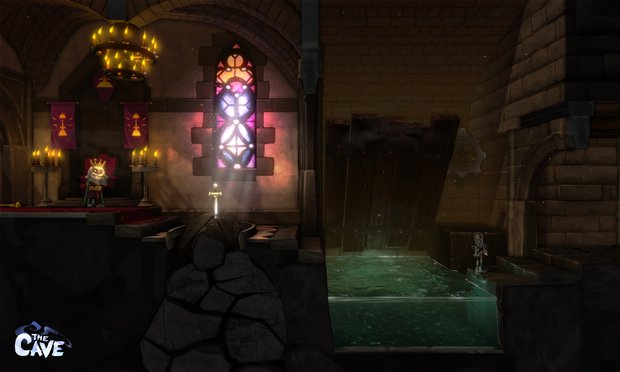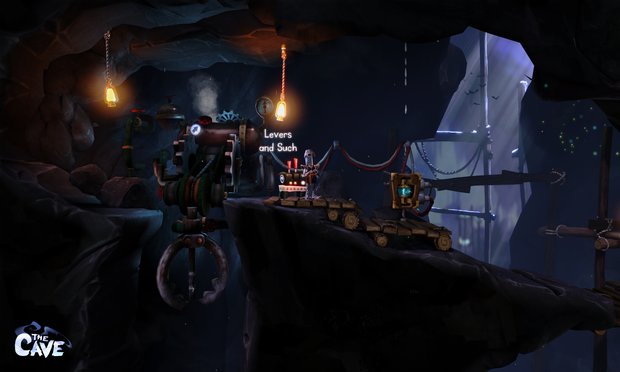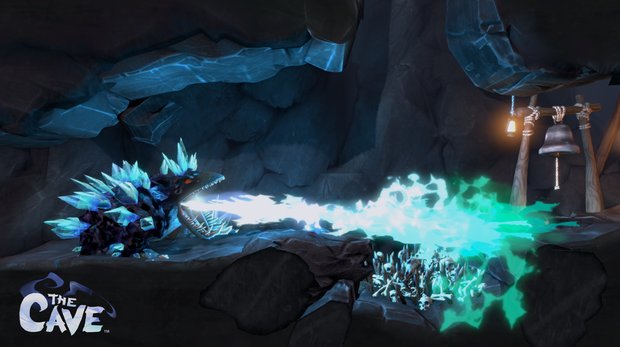The Caves Ron Gilbert: The big GamesRadar interview
Adventure game overlord talks creepy kids, indie triumphs and making the REAL Monkey Island 3
GR: It’s interesting that you’re talking so confidently about adventure games, both in terms of The Cave going more in that direction and wanting Monkey Island to go that way as well. Adventure games were supposed to be completely dead a few years ago, weren’t they? But we’ve had a massive resurgence over the last year or two. What’s caused that?
RG: There’s probably a couple of things that have caused that. One is that gaming is just becoming a lot more mass-market. Everybody plays games. Back when Gary and I were doing Maniac Mansion, or when I did Monkey Island, gaming was this very niche thing, and it wasn’t something that adults for the most part did apart from this very small niche of people. But today everybody plays games. I ride the train to work every day and half the people are playing games.
They’re playing on their iPhones and their Android phones, but they’re playing games. So gaming has become something that it’s socially acceptable for adults to do today. And I think that really helps adventure games because adventure games are typically about stories, they’re about characters. They’re not games where you have to have twitch reflexes. And games like that I do think have a large appeal for the mass-market.

GR: Going back to The Cave specifically, is it true that you had to go around pitching to publishers for the first time with this one?
RG: Yeah, actually this is the first time in my career that I have ever had to pitch a game to a publisher. Because at Lucasfilm, which was really the first job I had in the industry, we were the publisher. So pitching Monkey Island and Maniac Mansion, that was just a case of going into my boss’ office and going “Hey, I want to make this game”. And then when I left Lucasfilm I started Humungous Entertainment and we were also a publisher, so I didn’t have to pitch to anybody on those games. I was just deciding which ones to make.
So yeah this was the only time I’ve ever had to pitch a game to a publisher, so it was kind of an interesting experience to think that I’ve been in this business 20 years and this is the first time I’ve ever felt like a rookie going in. It’s like “Well okay, how do I do this”? [laughs] But we talked – not a lot – we talked to a handful of publishers and went around and pitched the game before Sega came on as someone who was particularly interested in it.

GR: Did you have any particularly awkward experiences with the pitching process?
Weekly digests, tales from the communities you love, and more
RG: Well you know it was kind of the common thing with publishers and adventure games. Where it’s like “Yeah, it’s a really good idea but ah y’know, I don’t know if adventure games are really selling right now…” So there was a real kind of reluctance because it was an adventure game. There was a little bit of push-back on that.
GR: It was almost surprising that Sega turned out to be the publisher. They’ve been a bit risk-averse lately, with a policy of only sticking to established franchises. The Cave seems really out of their comfort zone. What convinced them?
RG: You know I don’t know the answer to that question. I don’t know exactly that magic thing I said, but they from the beginning always embraced that it was an adventure game. It wasn’t something that we had to trick them into signing. [laughs] “Oh, this is really a first-person shooter”, you know, and we make an adventure game.
They really embraced the adventure game. They really thought that was neat. And I think one of the things they did respond to was that it was an adventure game but it was trying some new things. It was trying to address some of the issues that adventure games have had historically and trying to reach a different audience with them, and I think that appealed to them.
GR: Do you think adventure games have to be specifically produced in a different way these days, or is fun still just fun?
RG: I think fun is still fun. There were two other designers who worked on The Cave with me. We spent the first four or five months of the project just sitting in this back room at the office just brainstorming puzzles, and it felt like I was working on a classic adventure game again. It’s the same thing. It’s that same kind of creative energy. It’s that same way that you look at puzzles. And yeah, on some level I think that fun is just fun.

GR: What state of creative health do you think games are currently in? We’ve lost a lot of creative studios this generation, but a lot of cool off-kilter things are happening now too. Tim [Schafer]’s been a bit uncertain about next-gen. How do you think it’s looking?
RG: I actually think we’re really good right now. I have not been this optimistic about the way games are going in a long long time. And a lot of that is because you’re seeing a lot more interesting titles. The indie games scene has always been here. It was there when I was back making Monkey Island. But they had no way of distributing their games, right? So they would do all of these really cool indie things and then they would bring their floppy discs to some user-group meeting and maybe they’d let people copy it.
But now with the internet and the App Store and all of these other things, and Steam kind of opening up, a lot of the indie people really have an avenue now to make the really cool stuff they’ve always been making, but they can find an audience now. And I think that’s really neat, because they’re coming up with a lot of great things. And I think also with the whole industry really going in this digital way – I mean I do honestly belief in 10 years there will be no boxed product, that it will all be distributed digitally – I think that helps too because there’s just this whole cost infrastructure with distributing physical games that smaller publishers can’t do.
You know a company like Double-Fine, they can publish their own games now because they don’t have to have a warehouse full of DVDs or CDs or whatever sitting there. They can just do it digitally. And that really opens it up to a lot more people. And the more people that are making games, I think the better things are.



